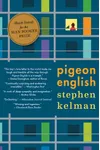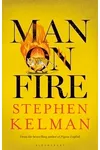Picture a British storyteller who turned a gritty council estate into a literary sensation—meet Stephen Kelman! Born in Luton in 1976, Kelman skyrocketed to fame with his debut novel, Pigeon English, a heart-wrenching yet hopeful tale that snagged a spot on the 2011 Man Booker Prize shortlist. His stories weave raw realities with gentle humor, giving voice to the marginalized and exploring themes of identity, innocence, and transformation.
With a knack for capturing the world through a child’s eyes, Kelman’s work resonates with readers who crave authentic, unflinching narratives. From a Luton tower block to global acclaim, his journey is as inspiring as the stories he tells.
The Making of Stephen Kelman
Raised on the Marsh Farm council estate in Luton, Stephen Kelman grew up in a vibrant, multiethnic community marked by poverty and resilience. A precocious reader, he devoured books far beyond his years, even reading GCSE-level texts at age six. After studying marketing at the University of Bedfordshire, Kelman juggled jobs as a warehouse operative, caseworker, and local government administrator. But his heart was set on writing, a dream he pursued seriously in 2005, penning screenplays before turning to novels.
The tragic 2000 murder of 10-year-old Damilola Taylor, a Nigerian immigrant in London, profoundly impacted Kelman, sparking the idea for his breakout novel. His own experiences on the estate, coupled with a deep empathy for underdog stories, shaped his unique voice.
Stephen Kelman’s Unforgettable Stories
Kelman’s debut, Pigeon English (2011), follows 11-year-old Harrison Opoku, a Ghanaian immigrant navigating life on a rough London estate. When a local boy is stabbed, Harri turns detective, his innocence clashing with the estate’s harsh realities. Written in Harri’s vivid, Ghanaian-inflected voice, the novel blends humor and heartbreak, earning praise for its authentic portrayal of youth and marginalization. It was shortlisted for multiple awards, including the Man Booker Prize, and became a GCSE syllabus staple.
In 2015, Kelman released Man on Fire, a fictional biography of Indian journalist Bibhuti Bhushan Nayak, a record-breaking eccentric. The novel explores friendship and life’s chaos through a lens of warmth and wit, showcasing Kelman’s versatility. His writing style—marked by sharp dialogue, childlike wonder, and unflinching social commentary—captures the beauty and brutality of human experience. Themes of identity, community, and transformation thread through his work, reflecting his own diverse upbringing.
Currently, Kelman is crafting his third novel, promising more stories that challenge and uplift. His ability to balance gritty realism with hope sets him apart in contemporary British fiction.
Why Stephen Kelman Matters
Stephen Kelman’s impact lies in his fearless amplification of marginalized voices. Through Pigeon English, he brought global attention to the struggles of immigrant communities and the loss of childhood innocence in urban settings. His work resonates with educators, appearing on school curricula, and inspires readers to confront societal issues with empathy. By drawing from real tragedies and his own estate upbringing, Kelman crafts stories that feel both universal and deeply personal.
His literary ascent from a slush pile to Man Booker fame proves that authentic storytelling can break barriers. Kelman’s legacy is one of hope, urging writers from all backgrounds to tell their truths.
About Stephen Kelman
- Born: 1976 in Luton, England
- Key Works: Pigeon English (2011), Man on Fire (2015)
- Awards: Shortlisted for 2011 Man Booker Prize, Guardian First Book Award, Desmond Elliott Prize
- Fun Fact: Teaches martial arts to disadvantaged kids in St. Albans
Ready to dive into a world of grit and heart? Grab Pigeon English and discover Stephen Kelman’s unforgettable storytelling!

